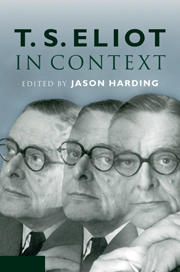Book contents
- Frontmatter
- Contents
- List of illustrations
- List of contributors
- Acknowledgements
- List of abbreviations
- Introduction
- PART ONE LIFE
- PART TWO FORMS
- PART THREE LITERARY CROSS-CURRENTS
- PART FOUR POLITICS, SOCIETY AND CULTURE
- 26 Politics
- 27 Economics
- 28 Anti-Semitism
- 29 Gender
- 30 Religion
- 31 Philosophy
- 32 Social science
- 33 Natural science
- PART FIVE RECEPTION
- Further reading
- Index
31 - Philosophy
Published online by Cambridge University Press: 05 August 2012
- Frontmatter
- Contents
- List of illustrations
- List of contributors
- Acknowledgements
- List of abbreviations
- Introduction
- PART ONE LIFE
- PART TWO FORMS
- PART THREE LITERARY CROSS-CURRENTS
- PART FOUR POLITICS, SOCIETY AND CULTURE
- 26 Politics
- 27 Economics
- 28 Anti-Semitism
- 29 Gender
- 30 Religion
- 31 Philosophy
- 32 Social science
- 33 Natural science
- PART FIVE RECEPTION
- Further reading
- Index
Summary
Looking back upon his study of philosophy, Eliot ruefully concluded that if he had turned to philosophy instead of to poetry, he might have achieved only a very modest place as a philosopher, becoming perhaps a sort of minor Edmund Husserl or Martin Heidegger. He also acknowledged though that if a poet has pursued philosophical studies, these will have played an important role in his formation and will have informed his poetry. This chapter will explore Eliot's study of philosophy within the context of the major philosophical debates that prevailed at Harvard University during the years he was a graduate student of philosophy there, in a period that has come to be known as the golden age of American philosophy, and will suggest how, despite his reservations about the philosophical theories with which he grappled – idealism, pragmatism and neorealism – his philosophical studies profoundly shaped his creative and critical vision.
When Eliot entered Harvard in 1906, it was dominated by the left-wing Unitarianism of President Charles William Eliot, which gave to Harvard its liberal ethos and its progressive and pragmatic character. Two teachers who played a vital role in shaping Eliot's views on the prevailing philosophical trends, as well as on literary issues, were Irving Babbitt and George Santayana. Both Babbitt and Santayana were opposed to President Eliot's elective system, as well as to Romanticism, liberalism, and the notion of progress, advocating instead Classicism and tradition.
- Type
- Chapter
- Information
- T. S. Eliot in Context , pp. 316 - 325Publisher: Cambridge University PressPrint publication year: 2011



